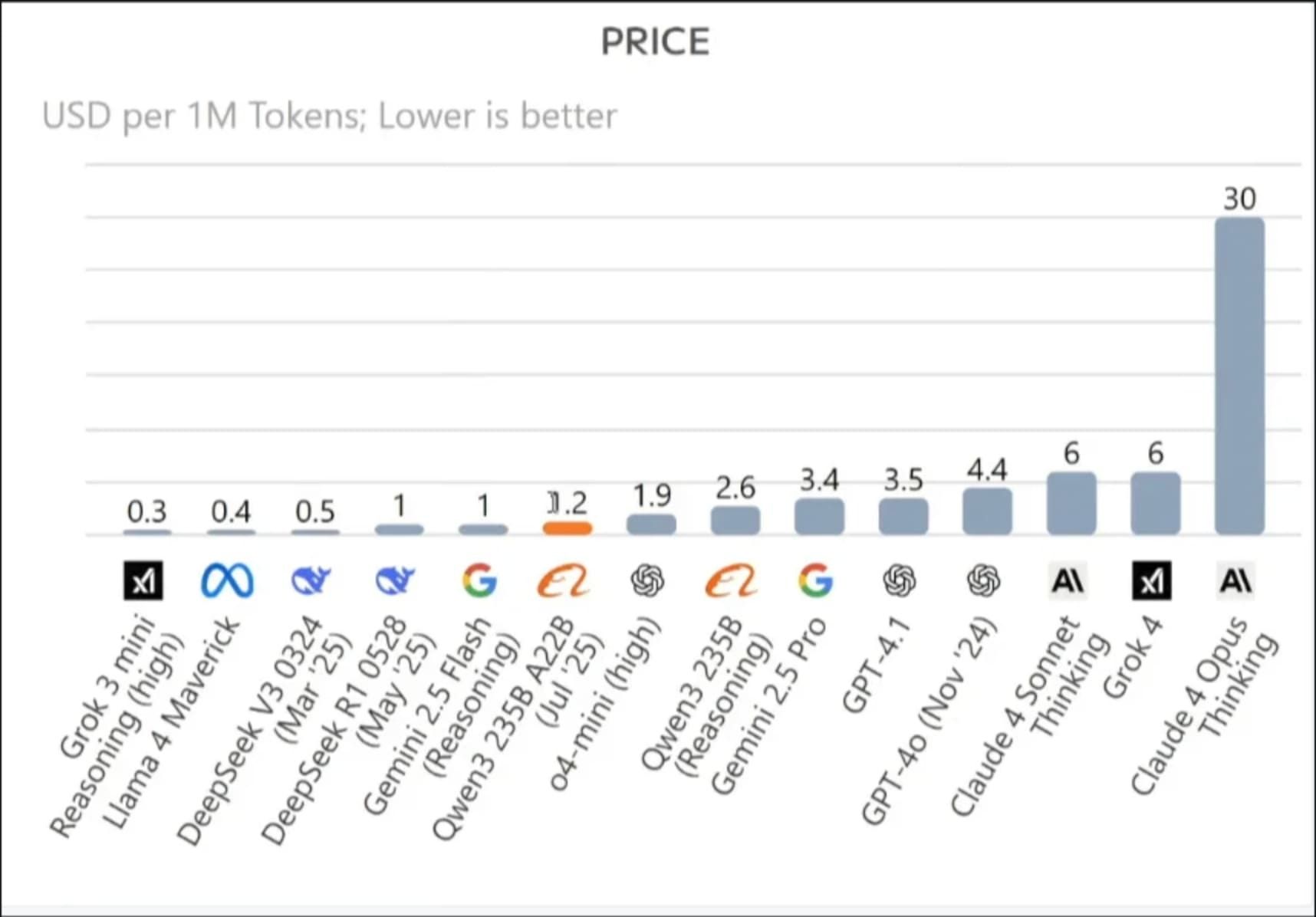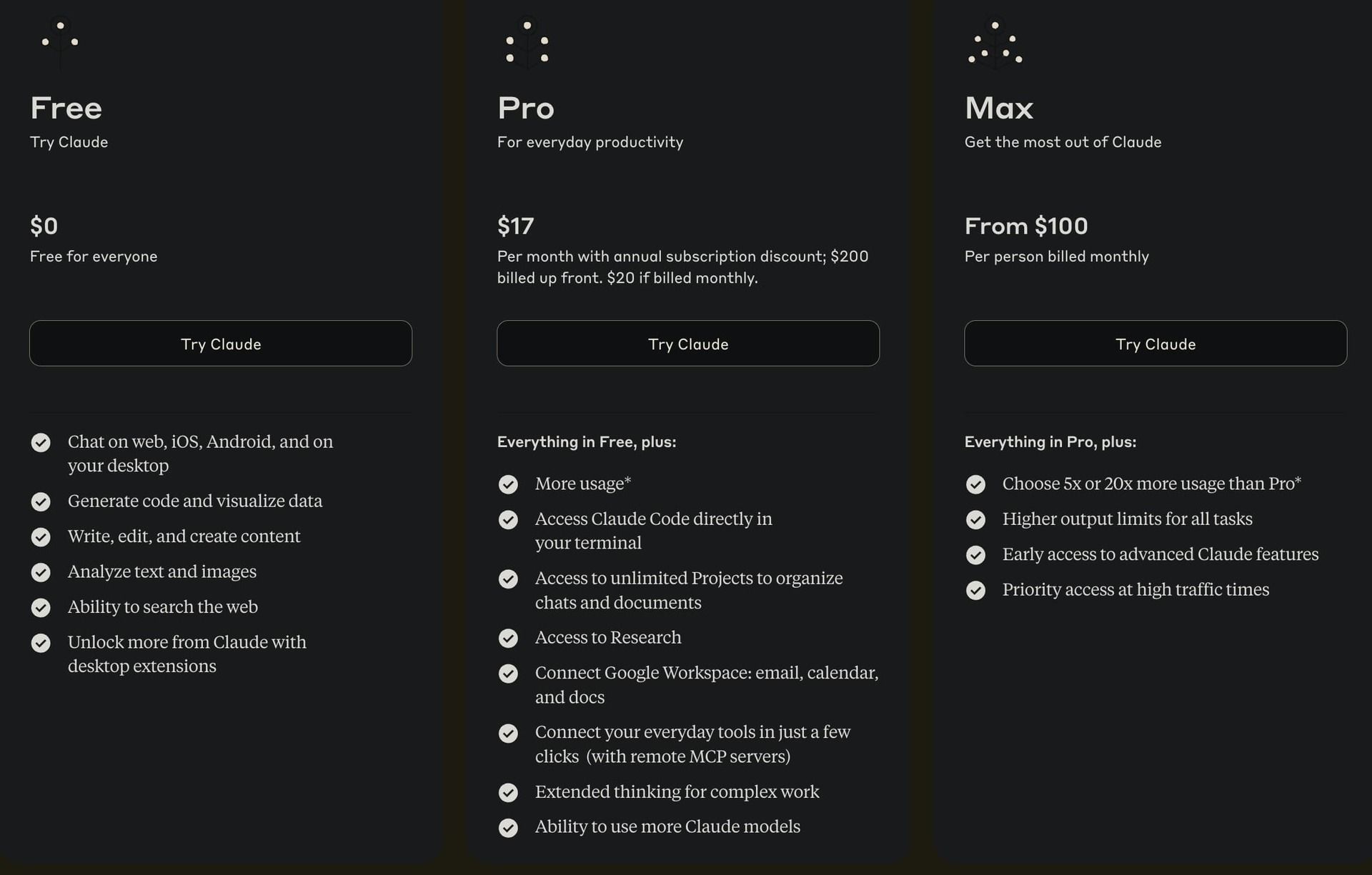- Startup Spells 🪄
- Posts
- How Anthropic's $200/month MAX Subscription Becomes a Steal by Making Opus API Pricing Expensive
How Anthropic's $200/month MAX Subscription Becomes a Steal by Making Opus API Pricing Expensive
PLUS: GPT's new "agent mode" is scary good at lead gen + enrichment
How Anthropic's $200/month MAX Subscription Becomes a Steal by Making Opus API Pricing Expensive
Anchoring is a classic marketing tactic. When a product carries a high price tag, it suddenly makes the other options feel like bargains.
Anthropic, the AI company behind Claude, knows this psychology well.

AI - LLM Providers Pricing in USD
Their Opus model towers over rival models in cost per one million tokens of API usage — 30 USD for Claude 4 Opus Thinking, versus just 3‑4 USD for models like Gemini 2.5 Pro and GPT‑4.1 and as little as 0.3 USD for smaller systems.
The gap isn't an accident. By intentionally pricing the Opus API high, Anthropic has created a price anchor. The expensive option draws attention to the value of their subscription plans, making them seem irresistible in comparison.
The numbers behind the anchor: Why $90 for 1M Tokens Makes $200 Look Like a Bargain
Anthropic's pricing page lays out the math:
Opus API pricing: The Claude Opus 4 model costs $15 per million input tokens and $75 per million output tokens. These prices are more than double most competitors.
Pro plan: $17 per month (with annual discount) or $20 per month unlocks higher usage limits, extended thinking, Claude Code access, and Google Workspace integration.
Max plan: Starting at $100 per month, offering either 5× usage ($100) or 20× usage ($200) compared to Pro limits. The 20× tier supports roughly 900 messages per session, giving heavy users effectively unlimited access.

Anthropic - Claude AI Pricing
These subscription prices are far lower than comparable API usage. Sending and receiving just 1 million tokens via the Opus API would cost $90 — before considering tool‑use overhead.
Heavy users could easily spend thousands per month on API calls, making the $200 Max 20× plan feel like a steal.
Anthropic's Decoy Effect: How Your Brain Gets Fooled by Expensive Options
Anthropic's strategy mirrors a well‑known marketing concept: Create a decoy product (the expensive API) to make other products (subscriptions) look attractive.
Here's the psychological play:
High anchor: Setting Opus API at $75/MTok output establishes a premium benchmark. Every other option appears cheaper by comparison.
Value contrast: Pro and Max subscriptions ($20 to $200 monthly) feel like bargains when contrasted with potential API bills of hundreds or thousands of dollars.
Predictability over metering: People fear unpredictable, metered bills. A flat monthly price provides certainty. Anthropic's high API pricing shifts conversations from "How much will I spend?" to "Which subscription tier should I pick?"
The Genius of an Expensive Option: The $30 Model That Sells $200 Subscriptions
To outsiders, charging $30 per million tokens seems greedy. Yet this high sticker price fuels a clever funnel:
It signals quality — Opus is marketed as the most intelligent model, so charging more reinforces premium perception.
It creates a revenue ceiling — large enterprises that must use Opus via API will pay, subsidising development costs.
Most importantly, it drives subscribers to more predictable and profitable plans. When the alternative is unpredictable API spend, "20 times the capacity for $200 a month" becomes enticing.
Sometimes the best way to sell your core product is not to discount it, but to surround it with an even pricier option.
Anthropic's Opus API may be costly, but it's a masterclass in using price anchoring to steer customers toward the subscription tiers where the real value — for both sides — lies.
Top Tweets of the day
1/
I found another fun Veo 3 prompt: "Realistic footage of the moon landing, but it took place in [year]"
Here is 1883 AD, 1255 AD, 44 AD, 2300 BC, 30,000 BC, and 65 million years ago
Yes, there is apparently wind on the moon back then, you are just going to have suspend disbelief
— Ethan Mollick (@emollick)
6:00 AM • Jul 25, 2025
Veo 3 looks insane. The games and the movies from 2026 onwards are going to be wild.
2/
Startup trends
— SignalRank (@SignalRank)
10:16 PM • Mar 28, 2025
AI is at a pace where there are sub-agents that can do things on its own.
Now there are 2 pieces of this equation:
Skill
Money
You need the right skill which comes from deliberate practice and you need a lot of money to be able to afford the best agents that can do things on its own.
But it allows you to get insanely rich. Do not ignore the money variable. The rich will get richer.
The best AI models are expensive to use.
AI Coding models are ahead of every other field. And the sub-agents era has started for them.
3/
look at Cursor's product/design hires:
@ryolu_ - ex-Notion
@milichab - ex-Notion
@JasonBud - ex-Notionwonder where they're going here...
hire people who have built products that you love
— Alex Romano (@xzwyzw)
11:29 PM • Jun 30, 2025
Smartest hiring strategy is to hire from the products you've loved. One way to do it is social engineering past employees of a company and taking them out for coffee.
Rabbit Holes
Automate Before & After UI Screenshots with CleanShot X and Amp by Sourcegraph
Deliberate intentional practice by Geoffrey Huntley
GPT's new "agent mode" is scary good at lead gen + enrichment... has anybody else tried it? by /r/Entrepreneur
What’d ya think of today’s newsletter? Hit ‘reply’ and let me know.
Do me a favor and share it in your company's Slack #marketing channel.
First time? Subscribe.
Follow me on X.
More Startup Spells 🪄
Private Equity (PE) Firm Owns Your Favorite YouTubers Channel (feat. Veritasium & Fireship) (LINK)
Strava's Sponsored Challenges Mobilize 50M Athletes With Native Ads (LINK)
There's Treasure Inside: How a $2M Bitcoin Scavenger Hunt Became Genius Book Marketing (LINK)
Candor’s Crowdsourced Hiring Tracker: A Masterclass in Product as Marketing (LINK)
Reply